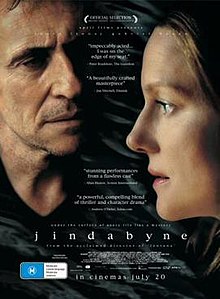| Jindabyne | |
|---|---|
 Theatrical release poster | |
| Directed by | Ray Lawrence |
| Screenplay by | Beatrix Christian |
| Based on | "So Much Water So Close to Home" by Raymond Carver |
| Produced by | Philippa Bateman Garry Charny Catherine Jarman |
| Starring | |
| Cinematography | David Williamson |
| Edited by | Karl Sodersten |
| Music by | Paul Kelly Dan Luscombe |
| Distributed by | Roadshow Films |
Release date |
|
Running time | 123 minutes |
| Country | Australia |
| Language | English |
| Budget | $10.8 million[1] |
| Box office | $6 million[2] |
Jindabyne is a 2006 Australian drama film by third time feature director Ray Lawrence and starring Gabriel Byrne, Laura Linney, Deborra-Lee Furness and John Howard. Jindabyne was filmed entirely on location in and around the Australian country town of the same name: Jindabyne, New South Wales, situated next to the Snowy Mountains.
It was one of a rush of over 16 Australian cinema releases that year.[3] Critics praised its refinement and the film is credited as a signal of Australian cinema's maturity.
The screenplay was written by Beatrix Christian, and was adapted from the late American short story writer and poet Raymond Carver's 1975 title, "So Much Water So Close to Home". The short story was the basis for a segment in Robert Altman's Short Cuts (1993). Carver's story had also been retold in music by Australian artist Paul Kelly in the song "Everything's Turning to White", on his 1989 album So Much Water So Close to Home. Kelly contributed to the score of the 2006 film as well.
Jindabyne had its world premiere at the 2006 Cannes Film Festival and its North American premiere at the 2006 Toronto International Film Festival. The film was released in Australia on 20 July 2006 and was released in the United States on 27 April 2007. Its production budget was reportedly $10.8 million.[1] The film was financed, produced and marketed by Sydney-based production company April Films, and majority funded by private investors.[4][circular reference]